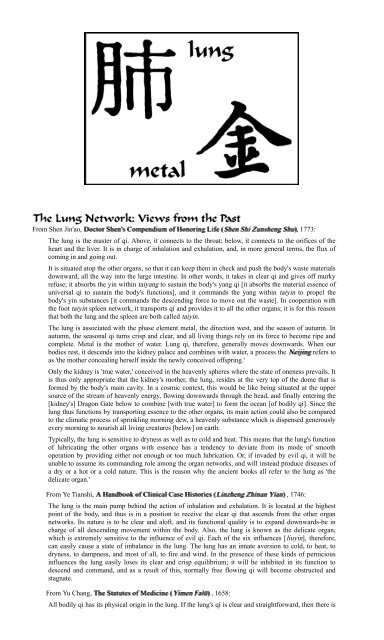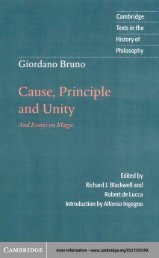Create successful ePaper yourself
Turn your PDF publications into a flip-book with our unique Google optimized e-Paper software.
From Shen Jin'ao, Docttor Shen''s Compendiium of Honoriing Liife (Shen Shii Zunsheng Shu), 1773:<br />
The lung is the master of qi. Above, it connects to the throat; below, it connects to the orifices of the<br />
heart and the liver. It is in charge of inhalation and exhalation, and, in more general terms, the flux of<br />
coming in and going out.<br />
It is situated atop the other organs, so that it can keep them in check and push the body's waste materials<br />
downward, all the way into the large intestine. In other words, it takes in clear qi and gives off murky<br />
refuse; it absorbs the yin within taiyang to sustain the body's yang qi [it absorbs the material essence of<br />
universal qi to sustain the body's functions], and it commands the yang within taiyin to propel the<br />
body's yin substances [it commands the descending force to move out the waste]. In cooperation with<br />
the foot taiyin spleen network, it transports qi and provides it to all the other organs; it is for this reason<br />
that both the lung and the spleen are both called taiyin.<br />
The lung is associated with the phase element metal, the direction west, and the season of autumn. In<br />
autumn, the seasonal qi turns crisp and clear, and all living things rely on its force to become ripe and<br />
complete. Metal is the mother of water. Lung qi, therefore, generally moves downwards. When our<br />
bodies rest, it descends into the kidney palace and combines with water, a process the Neiijjiing refers to<br />
as 'the mother concealing herself inside the newly conceived offspring.'<br />
Only the kidney is 'true water,' conceived in the heavenly spheres where the state of oneness prevails. It<br />
is thus only appropriate that the kidney's mother, the lung, resides at the very top of the dome that is<br />
formed by the body's main cavity. In a cosmic context, this would be like being situated at the upper<br />
source of the stream of heavenly energy, flowing downwards through the head, and finally entering the<br />
[kidney's] Dragon Gate below to combine [with true water] to form the ocean [of bodily qi]. Since the<br />
lung thus functions by transporting essence to the other organs, its main action could also be compared<br />
to the climatic process of sprinkling morning dew, a heavenly substance which is dispensed generously<br />
every morning to nourish all living creatures [below] on earth.<br />
Typically, the lung is sensitive to dryness as well as to cold and heat. This means that the lung's function<br />
of lubricating the other organs with essence has a tendency to deviate from its mode of smooth<br />
operation by providing either not enough or too much lubrication. Or, if invaded by evil qi, it will be<br />
unable to assume its commanding role among the organ networks, and will instead produce diseases of<br />
a dry or a hot or a cold nature. This is the reason why the ancient books all refer to the lung as 'the<br />
delicate organ.'<br />
From Ye Tianshi, A Handbook of Clliiniicall Case Hiisttoriies (Liinzheng Zhiinan Yiian) , 1746:<br />
The lung is the main pump behind the action of inhalation and exhalation. It is located at the highest<br />
point of the body, and thus is in a position to receive the clear qi that ascends from the other organ<br />
networks. Its nature is to be clear and aloft, and its functional quality is to expand downwards-be in<br />
charge of all descending movement within the body. Also, the lung is known as the delicate organ,<br />
which is extremely sensitive to the influence of evil qi. Each of the six influences [liuyin], therefore,<br />
can easily cause a state of imbalance in the lung. The lung has an innate aversion to cold, to heat, to<br />
dryness, to dampness, and most of all, to fire and wind. In the presence of these kinds of pernicious<br />
influences the lung easily loses its clear and crisp equilibrium; it will be inhibited in its function to<br />
descend and command, and as a result of this, normally free flowing qi will become obstructed and<br />
stagnate.<br />
From Yu Chang, The Sttattuttes of Mediiciine (Yiimen Fallü) , 1658:<br />
All bodily qi has its physical origin in the lung. If the lung's qi is clear and straightforward, then there is

















